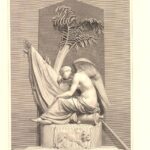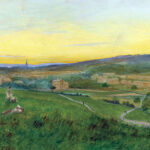1 August 1813: The Leeds-based 51st Foot wear bay leaves, not white roses, on Minden (now Yorkshire) Day, as they drive Napoleon’s troops back over the Pyrenees
Frederick Jennet Mainwaring. 1844/10. Four Years of a Soldier’s Life, by a Field Officer (2). Colburn’s United Service Journal and Naval and Military Magazine, Vol. 46, Part 3. London: Henry Colburn. Get it:
.Excerpt
The regiment, in compliance with an old custom of the corps, placed laurels [bay] in our caps, and, as we passed the several regiments of the division, early in the morning, with our band playing the air of the 1st of August [the Minden March, or the British Grenadiers], they each saluted us with three cheers, their bands striking up at the moment the same lively air. The day was a splendid one, and in high spirits we moved up the road, over which we had fought the previous day, and by which the French had retired, halting that night in the neighbourhood of St Estevan, a beautiful little town embosomed in mountains, whose sides were smiling with the highest possible state of cultivation, and fields of wheat, barley, and Indian corn, mingling their rich tints together, and chequering the scene around, with gardens and orchards, and thus forming one of the loveliest valleys I almost ever saw.
Comment
Comment
It is a commonplace that the Minden March shares its tune with the British Grenadiers, but Ernest Hart distinguishes between the two:
“The British Grenadiers” is common to all Fusilier regiments, to the Royal Artillery and the Royal Engineers, as well as to the Grenadier Guards and the Royal Fusiliers. It has not, however, been the regimental quick-step of all the Fusilier battalions for the same period of time. Prior to 1881 the quick-step of the old 20th Foot was “The Minden March.” In that year the regiment was renamed the Lancashire Fusiliers and, according to order, now plays “The British Grenadiers,” the replaced march tune being still used for marching past in quarter-column. “The Minden March” is an old hymn tune named “Lammas Day,” the Battle of Minden, in which the old 20th Foot bore a conspicuous part, happening on August 1st, Lammas Day. The effect of using a hymn tune for a quick-step is at least odd and incongruous, and the last Duke of Cambridge, who was Commander in Chief, expressed his objection to the practice in the forcible language which he affected, remarking that it was “damned sacrilegious.” (Hart 1918/10)
Perhaps the shift from bay to rose took place because the latter are more readily available in England and because they facilitated and fomented the creation of regional identities for regiments.
Always more of a Lancashire thing than Yorkshire – source re the regiments which had it first,
The following, perhaps already mythicised, pre-WWI celebration of the rose myth, “from Reveillé to Lights Out, and in the Officers’ Mess to a much later hour,” and including the Henry VI-style rose-eating, is by Lieut.-Colonel Hugh Watson Channer (1878-1948) of the Royal Marines, son of General George Channer VC of the Indian Army. It was published shortly after victory over the Nazis:
The last notes of Reveillé float clear into the summer sky and die away. Each bugler has blown his best this morning of 1st August – Minden Day – and that rousing call has seldom been better sounded. A short silence follows, broken a few moments later by a roll of drums. A word of command echoes across the parade ground. The drums advance “beating to action.” They march past the officers’ quarters, beyond, and then around the boundaries of the barracks where The Lancashire Fusiliers – the old 20th Foot – are quartered. The rattle and clatter of the drums make stirring music…
Prior to 1914, in the days of scarlet tunics, gold lace and pipe-clayed belts, the forenoon saw the Trooping of the Colour – a ceremony impressive with its stately dignity. The Regimental Colour is surmounted with a wreath of roses. The Drum-Major’s staff, all drums and all headdresses are decorated with roses. At the saluting point, surrounded by a distinguished gathering of officers and privileged spectators, unseen but surely present, is that brilliant soldier, General James Wolfe, who from 1750 to 1758 had commanded the 20th Foot with conspicuous success and who, six weeks after his old regiment had gained such glory at Minden, met his end on the Plains of Abraham. The gallant spirit of their beloved commander lives on and is never absent from this or any other of the Regiment’s anniversaries.
Something of the pageantry of the past reappears when the Regimental Colour is taken in slow time along the ranks to the right of the line: a movement affording every man an opportunity of seeing at close quarters the Colour – the soul of the Regiment. Finally, to the stirring strains of the regimental march, “The British Grenadiers,” the successors of his service swing past in quick time and the critical eye of Wolfe witnesses and approves.
The ceremonial parade ends. Special dinners are provided for the men this day; they are visited by all officers. During the afternoon and evening, entertainments are organized for the rank and file in which officers also take part.
Dinner in the Officer’s Mess is a notable event. Imagine the scene. Note the long, well-polished mahogany table with its silver, trophies and glass and bowls of red roses down the centre. Roses also mark each place at table, while on the wall above the fireplace are the Colours, uncased and bearing the wreaths commemorative of the day. On the wall, too, hangs the original painting by Sir Joshua Reynolds of General Charles Kingsley, a former Colonel who at Minden was in command of a brigade. It was this officer who declined to accept the direction of Prince Ferdinand excusing the 20th on account of its heavy casualties from further duty after the battle until rested and brought up to strength. A General Order records that “Kingsley’s Regiment, at its own request, will resume its portion of duty in the line!” The picture is a valued possession and is always held by the Home battalion.
The Mess Sergeant, who alone in that gathering is not in uniform, for custom decrees that he wear the sober garments of a butler, announces to the Mess President waiting with all officers in the ante-room that “dinner is served.” The string band strikes up and, to the strains of “The Roast Beef of Old England,” the officers in scarlet mess jackets with silk facings enter the mess room and take their places.
Standing to attention on either side of the room and a few paces behind the chairs are the officers servants in the livery worn by them at Mess – blue tail-coats with large silver buttons bearing the regimental crest; dark blue knee-breeches with silver band at the knee; waistcoats of primrose (the original “facings” of the Regiment) on which the silver buttons have XX to recall the old number in use prior to the county designation; primrose stockings; silver buckled patent leather shoes; white gloves. It is a gay and striking scene.
The band plays throughout dinner. With the passing of the wine comes the toast: “The King,” followed by the only other allowed on this occasion : “The toast of the year, gentlemen, in solemn silence: to those who fought and fell at Minden.” Yet another tribute to the gallant dead is the “Minden March,” played on the brass instruments of the band as it marches round the room.
Then follows the initiation of any officer who has not previously eaten a rose on this historic anniversary. “With the President’s compliments, Sir, will you enjoy a rose?” With this message the Mess Sergeant offers on a salver a rose which the officer must eat under the strict eyes of his neighbours and assisted by a glass of champagne – in still earlier and less merciful days to a stern warning of “No heel tap!”
(Channer 1945)
Inevitably, Channer takes his epigraph from Kipling:
The men that fought at Minden, they ‘ad buttons up an’ down,
Two-an’-twenty dozen of ’em told;
But they didn’t grouse an’ shirk at an hour’s extry work,
They kept ’em bright as gold.
(Kipling 1895)
Here is the Minden March, now known as the British Grenadiers:
Something to say? Get in touch
Original
Next day, the 1st of August, the anniversary of the battle of Minden, the regiment, as one of those who were engaged on that glorious day, in compliance with an old custom of the corps, placed laurels [bay] in our caps, and, as we passed the several regiments of the division, early in the morning, with our band playing the air of the 1st of August [“Lammas Day”/”The Minden March”], they each saluted us with three cheers, their bands striking up at the moment the same lively air. The day was a splendid one, and in high spirits we moved up the road, over which we had fought the previous day, and by which the French had retired, halting that night in the neighbourhood of St. Estevan, a beautiful little town embosomed in mountains, whose sides were smiling with the highest possible state of cultivation, and fields of wheat, barley, and Indian corn, mingling their rich tints together, and chequering the scene around, with gardens and orchards, and thus forming one of the loveliest valleys I almost ever saw.
From this Eden, at day-break, on the 2nd, the bugles sounded for our departure, and taking guides, we moved by a steep path across the mountains, to take up our old ground near the village of Echellar. In the midst of this march, and whilst on the summit of one of these mountains, there came on so dense a fog, that we literally could not see two feet before us, and were obliged to halt for some time; our mortification greatly increased by hearing a tremendous and incessant fire of musketry, which we knew must proceed from part of our own division engaged with the enemy, and in which this fog rendered it impossible for us to take any part. On its clearing away, we moved rapidly forward, and found that General Barnes’s Brigade (24th, 58th, 6th, and Brunswick-Oels) had come up with two French divisions, which that gallant officer instantly attacked, and continued to engage, and actually drove back; and this brave brigade, confiding in their invincibility and the fine fellow at their head, continued to push on, unsupported, for several hours; their loss was consequently tremendous, though well were they rewarded by the splendid compliment paid them that evening by Lord Wellington himself, who declared it “the finest, the most gallant thing, he ever witnessed.”
Those were spirit-stirring days indeed; and although it may perhaps be wrong to say so, yet what has life to offer now that can compare with them? How tame, how stupid; how insipid, does all the monotony of the daily routine of drills, peace-guards, and dress-parades, which now fill up and fritter away our time, appear to them whose lives for years were passed in camps, living in the open air, seeing the glorious sun rise every day, or watching, by the piquet-fire at night, the beautiful stars, their minds elevated by the thought that they were doing their duty to their country, that the eyes of all Europe were upon their slightest movements, their hearts beating with enthusiasm, as victory followed victory; and if death sometimes came in the midst of all this, its sting was scarcely felt, since the soldier’s soul winged its flight to heaven mid the roar of cannon, the blaze of musketry, and the victorious cheers of his gallant comrades.
The whole period of our stay amongst these mountains was delightful; each encampment was, if possible, more beautiful than the last, and at this season of the year, our gipsy life, passed mid the grandest and most lovely scenery, and under bright suns and cloudless skies, was one which could not be otherwise than agreeable.
627 words.
Similar
 28 July 1809: The Napoleonic career of Richard Beckett of the Coldstream Guards, Meanwood (Leeds), and the MCC, who fell today at Talavera (Toledo)
28 July 1809: The Napoleonic career of Richard Beckett of the Coldstream Guards, Meanwood (Leeds), and the MCC, who fell today at Talavera (Toledo) 26 August 1914: From Pontefract to the mines on the Franco-Belgian border: Cpl. Frederick William Holmes wins a VC at Le Cateau
26 August 1914: From Pontefract to the mines on the Franco-Belgian border: Cpl. Frederick William Holmes wins a VC at Le Cateau 23 May 1793: The 14th Foot, predecessors of the West Yorkshire Regiment, chant a French Revolutionary song as they storm enemy trenches at Famars (Valenciennes)
23 May 1793: The 14th Foot, predecessors of the West Yorkshire Regiment, chant a French Revolutionary song as they storm enemy trenches at Famars (Valenciennes) 27 June 1743: Tom Brown of Kirkleatham’s heroics against the French today at Dettingen (Bavaria) lead his general, George II, to grant him a silver prosthetic nose, immortalised in ballad and portrait
27 June 1743: Tom Brown of Kirkleatham’s heroics against the French today at Dettingen (Bavaria) lead his general, George II, to grant him a silver prosthetic nose, immortalised in ballad and portraitSearch
Donate
Music & books
Place-People-Play: Childcare (and the Kazookestra) on the Headingley/Weetwood borders next to Meanwood Park.
Music from and about Yorkshire by Leeds's Singing Organ-Grinder.



 Bluesky
Bluesky Extwitter
Extwitter